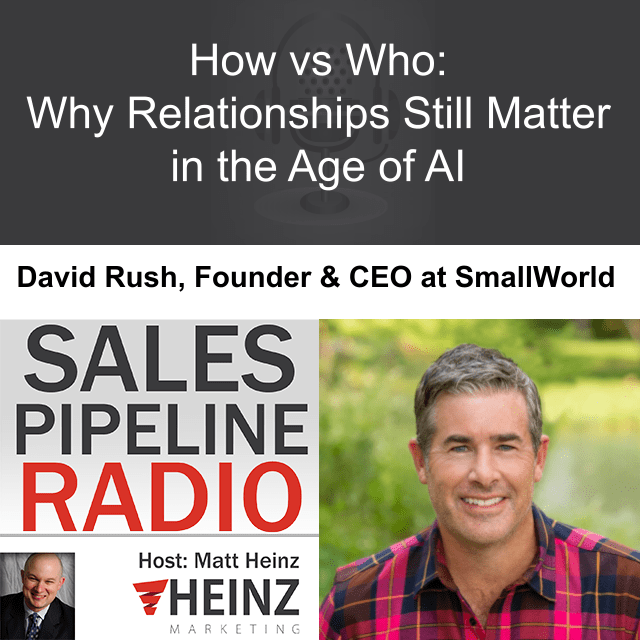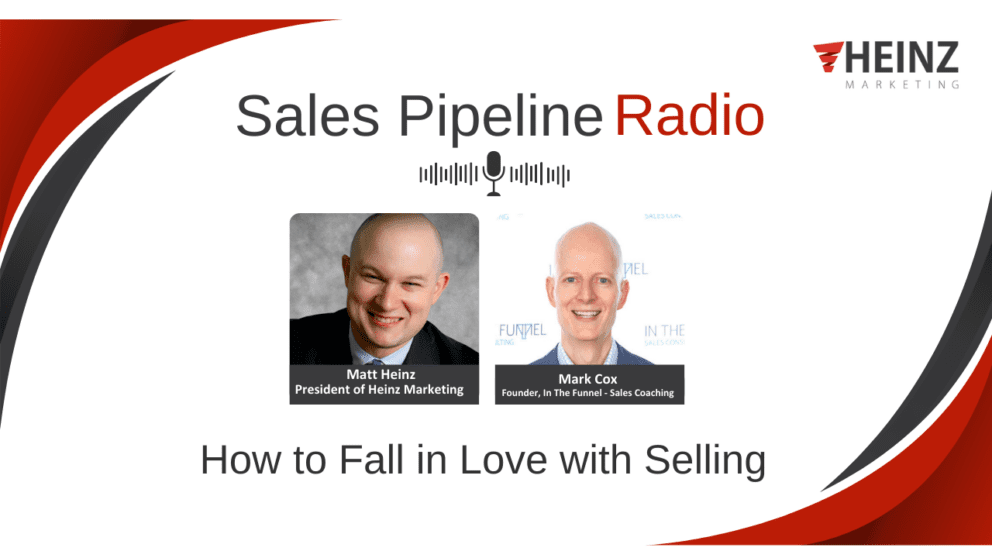Sales Pipeline Radio, Episode 337: Q & A with David Rush @davidmrush

By Sheena McKinney, Sales Pipeline Radio Producer
If you’re not already subscribed to Sales Pipeline Radio or listening live every Thursday at 11:30 a.m Pacific on LinkedIn (also on demand) you can find the transcription and recording here on the blog every Monday morning. The show is less than 30 minutes, fast-paced and full of actionable advice, best practices and more for B2B sales & marketing professionals.
We cover a wide range of topics, with a focus on sales development and inside sales priorities. You can subscribe right at Sales Pipeline Radio and/or listen to full recordings of past shows everywhere you listen to podcasts! Spotify, iTunes, Blubrry, Google Play, iHeartRADIO, Stitcher and now on Amazon music. You can even ask Siri, Alexa and Google or search on Audible!
This week’s show is entitled, “How vs Who: Why Relationships Still Matter in the Age of AI“ and my guest is David Rush, Founder/CEO of SmallWorld.
Tune in to hear more about:
- Why sales and marketing are about timing and trust and how companies can leverage trust as an asset more often.
- Why relationships are critical to business success, and why it’s not always easy to measure their depth.
- How SmallWorld helps companies identify the fastest path of connectivity into senior-level decision-makers by getting down to the person level and enabling warm introductions from people within the ecosystem of a company who have relationships and intrinsic motivation to make those introductions.
Watch the video, listen in below and/or read the transcript below.
Matt: All right. Welcome everyone to another episode of Sales Pipeline Radio. I am your host, Matt Heinz excited to be with you here on another Thursday. As the days get warmer, the days get longer. definitely well into spring, up here in the beautiful Pacific Northwest, wherever you are watching and listening.
If you’re watching listening live today to Sales Pipeline Radio. Thank you so much for joining us in the middle of your workday. If you are. Live with us on LinkedIn. You yes, you can be part of this conversation in this call today. If you have a question or comment for our guests today, if you have a rebuttal, something interesting to say, feel free to throw that into the LinkedIn chat.
We’ll reference you, we’ll bring you up on screen. bring your comment on screen and try to make this as interactive as possible if you are listening and watching, on demand. Thank you so much for continuing to [00:01:00] download, to subscribe, every episode of Sales Pipeline Radio. Past, present, and future available at salespipelineradio.com, on demand download. lots of good stuff in the, in the archives. Great speakers. Great authors, great, entrepreneurs. Very excited today to have, joining us, the, the founder, of Small World, David Rush. Dave, thanks for joining us today.
David: Thanks Matt. Great to be here.
Matt: So I’ve been really excited about finally getting you on the show, because I think, the more tech we get, the more AI becomes part of the headlines, the more it just reinforces to me that machines can only go so far and that it really is the relationships we have with each other that has always been and will likely continue to be the very backbone of business.
Talk a little bit about what you’re building with SmallWorld and why that’s so important right now.
David: Yeah. Just what you said, relationships, matter so much in terms of creating new opportunities. the way we look at it is that sales and marketing is about timing or trust, and of course with timing, you want your brand to be top of mind when vendor decisions are being [00:02:00] made. third party intent data is really important to understand if people are in market. But when we think about trust, that’s an enduring thing and, it’s an asset that a lot of companies don’t leverage as much as they could, whether it’s a personal relationship or a professional relationship.
if you think about, work alumni networks or people even in your community, that trust is ultimately what drives a decision. And so, what we’re building at SmallWorld is the ability for companies to operationalize these warm introductions and referrals through the power of trust. And so by combining, timing with trust, it kind of creates the ultimate bullseye for, for sales and marketing teams.
Matt: This idea of trust is so important. I want to dig in on this further because there’s relationships and then there’s trust and those are not equal. I’d say we have a lot of relationships, but just think about people that come to you and say, “hey, could you vouch for me on this?” Or, “Hey, would you recommend certain person?” You may have a relationship, but unless you’re willing to stake your own relationship, put your relationship on the line. There’s got to be a real amount of trust there. So, there’s a depth of relationships that isn’t always evident when you look at shared connections on LinkedIn or when you look at someone’s Rolodex. So, understanding and getting to that real meaningful connective tissue is just so critical, and yet it’s always been so elusive.
David: That’s exactly right. That’s one of the reasons why we’ve given the connectors in our systems the ones that are making those introductions, the ability to rate the strength of their relationship so they can rate it from very strong to very weak, and it tells us a lot.
We’re able to measure. The likely conversion rates, when those that have very weak relationships are asked to make introductions versus those that are very strong. Obviously, the way in which those introductions might be made can vary from a quick text to a close friend to, “Hey, I’m having to make this introduction, but I don’t know them well”.
I’d like a, carefully crafted custom email that I can forward, that will read a bit more appropriately. So we’re really learning, to your point, that strength of the relationship becomes so important, because, it really is the connector in this transaction that becomes the most important one when, warm introductions come into play.
Matt: When I think about some of the, rise in partner ecosystems and just ecosystem led growth organizations, you’ve got tools, you’ve got more people putting a focus on that. It seems to me a lot of what’s been done to date has been around. mapping accounts to each other, saying, who are the accounts you care about?
Who are the accounts I care about? And an overlap of accounts is kind of like that LinkedIn first connection, right? It really doesn’t tell me where the relationships are. It doesn’t tell me what your history is with those companies and your history with the companies irrelevant because it’s really the building.
You don’t have a relationship with the people in the building you have a relationship with, right? And so finding ways to connect the people. I could almost argue that this should be part of your ideal customer profile definition. you have an overlap from a company needs standpoint, but don’t have a relationship, if there’s a smaller deal where you have a relationship that can get that deal done faster in a higher likelihood, shouldn’t that get to the core of who we’re targeting in the first place?
David: That’s right. you described exactly how teams will use, SmallWorld to do account planning and prioritization and really inform who’s part of that team for team-based selling. Right? When you think about, the fastest path of connectivity into senior level decision makers, it’s identifying where those relationships exist.
And so, although that partner overlap and an understanding of where, you know, there’s mutual interest is important, to your point, getting down to the person level, allows us to really understand the best path there. And frankly, we look beyond partners too. So if you think of customers or advisors or even, spouses of employees, there’s people within the ecosystem of a company who have relationships and have intrinsic motivation to make those warm introductions. So we really look a little bit more broadly at, how to enable that.
Matt: Talking today on Sales Pipeline Radio with David Rush, he’s the founder and CEO of SmallWorld. We’re talking about the power and importance of trust, and why relationships and the connective tissue of those relationships matter, in creating connections and helping people get stuff done.
You mentioned earlier the idea of the third-degree relationships, and I think a lot of times we rely on those who do, you know, second degree? How far does trust go and when does trust start to weaken a little bit? if I’m asking for someone’s help, can they go a couple degrees down and where does that trust play best?
David: Yeah, you made the point a little earlier about, investing in that relationship and, and maintaining, social capital and trust. And so those introductions that are made by the connector, need to be carefully considered before they do so. But when we find the connector has established and confirmed a very strong relationship.
So this is someone you’ve known probably for a long time. You’re in communication with them, if not weekly, monthly. And there’s a tremendous amount of trust built there. a lot can happen. And as an example, if you were to have a very strong relationship with, your friend Christie and Christie used to work at, let’s say, Adobe, right, for five years.
The idea is that you would be able to be a path of engagement for a salesperson into Adobe based on the strength of that relationship. Now, if we didn’t know that relationship strength, it would be a little presumptuous to think that just because you’re connected, to her, that she would be able to open up that door. But if that’s a close friend, she probably still knows some people at Adobe. And so what we are doing is peering into things like work history to identify. a path, of connectivity, into any target prospect.
Matt: The relationships we’re talking about and the trust that exists like this information isn’t in a CRM, right? You may see that you know someone, you may see that you have a history with someone. But really understanding is this someone I trust? Is this someone I’d be willing to vouch for? Is this someone I would stake my reputation on? I don’t know where that exists today, but my question to you is, will technology improve to the point, will we be able to use machine learning or AI somehow to be able to identify where those relationships truly exist with some small margin of error? right now, I’ve been deep into SmallWorld, and you go in and you rank who you know and do that personal, definition I guess. Will technology help bridge the gap there?
David: It’s a tough thing because relationships are subjective. And so we’ve taken the approach that if we can make it as easy as possible for the connector to know who to rate the relationship with. So curation of those people that you might know that are important to whoever you’re making introductions for, and to make that user experience so simple that it’s a, click and, give you control.
We can assure a hundred percent accuracy with that relationship strength to where we’re actually not having to guess, and use, other data points to try to assume a relationship strength. It is, impossible to do so. Every person will, view a relationship, that they have with someone else, differently.
And so, I think you really want to combine the efficiencies of, what we can do to scale and understand who knows who at the same time, giving those connectors control also gives them the ability to know that they’re, choosing who they want to make introductions to and when.
Matt: Totally get that. the more, you talk about the efficiency of being able to do this in the time you save, not just in finding people you can, work through and with, but also eliminating the waste of people that aren’t going to be valuable for you and you’re not going to be valuable for them and vice versa.
I’ve been thinking mostly about this in the context of sales and business development, partnerships, but also that seems like, you could use this in hiring, right? it seems like the use cases of being able to better get to the points of trust…, what other use cases are you seeing people leverage this technology and this opportunity in all different points of business?
David: when we, have, connectors in the system who have gone through and rated the relationships, what we hear is you’ve really helped reduce the noise and I don’t get irrelevant requests anymore, and I’ve brought more, fidelity to my network. And so we’re looking at ways to, deliver more value to these connectors in, a new version of a CRM where they can see who they know per personally, professionally, They understand where they have strong relationships, where they don’t. As we, continue to identify those relationships, to your point, a myriad of use cases emerge where, hiring teams, business development teams, customer success teams that are seeking to make sure that retention is high. really again, tapping into that power of trust, can be applied in a lot of parts of the business.
Matt: Love it. talking today again, Sales Pipeline Radio with, David Rush, the founder of SmallWorld and David, this isn’t your first rodeo. I want to take a step back and just talk a little bit about the blessing and the curse of entrepreneurship. someone once described to me it is, it’s kind of like chewing glass, you know?
It is not for the faint of heart. you’ve been through this a few times. I’m curious for people that are listening that either are going through it themselves or thinking they may want to sort of start something down the road, what are some of the lessons you’ve learned along the way that are important to, keep in mind as you follow that entrepreneurial journey?
David: I think you have to be really passionate about the problem you’re solving. my background and experience, I’ve been a, a salesperson, a sales leader. I’ve also been someone who’s asked for warm introductions and I knew. something was broken, and that there was a better way to do it.
And so that drives me every single day. I know that there’s a business outcome if we get this right to where there’s, tangible benefit. And so I almost feel obligated to solve this problem for all the companies out there that can, drive more efficiency, in their business.
because I’ve seen it firsthand. and I think you, do have to love the battle. You’ve gotta love the fact that you are going to get 19 no’s every day for that one yes. And just be a hundred percent comfortable with it. And, have conviction, but also have, humility and an open mind to take in, feedback and understand how to make adjustments, whether it’s from an investor or from a customer. You have to love the battle. You have to be, hyper-competitive and also, build a strong team around you.
Matt: Yeah, absolutely. it seems like, some of the barriers to entry for hanging up a shingle and doing something on your own continue to go down, right? The ability to work remotely, the ability to use, cloud computering resources to build, the cost in some cases, depending on what you’re building, starting small growing, that could be a blessing and a curse, right? just because it’s easier and cheaper doesn’t necessarily mean it’s right.
You’ve had a lot of different things you could, have [00:12:00] focused on in small roles and leveraging this power of trust and I, what I think is the blue ocean in front of it, seems like a really good decision.
But how do you, decide if the risk is worth it? How do you decide that the chewing glass, that is not guaranteed ever is going to be the right path to move forward. And I ask that in part because especially in this market where a lot of great companies are born during recessions, people get laid off when they decide, okay, I’m going to go do something.
Some people do it, some people don’t. what do you think the calculus should be to decide I’ve got an idea; I’m going to go for it?
David: I truly do believe, the ability to be so committed to the mission that you’re on to where it never feels like work. mm-hmm.
You know, Mondays feel like Fridays, you have to balance, family commitments and other things. But this isn’t a job. it’s, a mission, right? And I think if you approach it that way there could be, a financial outcome, but that’s not your primary motivation.
All the stories you read on Twitter and LinkedIn, if you’re caught up in that, you’re doing it for the wrong reasons. You really need to be a creator. and you need to be able to, tap into that imagination. And so it’s a combination of, right brain and, and left brain. You either would feel underwhelmed, I guess, not doing it. and feel like you were, not fulfilling something that you, know, were supposed to do. And if you don’t feel that way, then it’s certainly worth looking a little bit closer at it.
Matt: I think going in eyes wide open is, is really, really important, right? Cause you see a lot of, headlines full of a lot of success stories and right now you see a lot of companies doing layoffs, but the startups that don’t succeed don’t typically get written about at the end, right? And so, certainly eyes wide open knowing that, the first one might not be what you want it to be.
I think there’s so many examples of companies where… investors and seed funders folks say this all the time. It’s not always just about the idea, it’s about the people, right? Yeah. It’s about the resilience and the mindset of the people that, can pivot to something else and if your commitment and passion is there, you’ll find something that, will help you be successful.
David: Yeah.
Matt: Love it. Absolutely. hey, listen, before we wrap up, for people that are interested in learning more about SmallWorld, I know you guys are in beta, you’ve got a super connector group that you’re working with right now, but for folks that want to get in line to be able to leverage this technology, where should they go?
David: We’re live in production, with, several customers. We’re in beta with, as you mentioned, an external network concept, and we should be live with that, later this quarter, early next. but you can find us at SmallWorld so, yeah, reach out. We’d love to give you a demo and, share with you how we’re helping other companies.
Matt: Awesome. Well, thank you so much for your time. Love the ability to talk a little bit about trust, relationships, and delve into a little bit of entrepreneurialism as well. David Rush, founder of SmallWorld. Thanks so much for your time today.
David: Thanks Matt for having me.
Matt: Awesome. Well thank you everyone for watching. I look forward to seeing many of you again next week. Thursdays 11:30 Pacific, 2:30 Eastern. My name is Matt Heinz. We’ll see you next time on Sales Pipeline Radio
Listen to the Latest Episodes:
Matt interviews the best and brightest minds in sales and Marketing. If you would like to be a guest on Sales Pipeline Radio send an email to Sheena@heinzmarketing.com.




